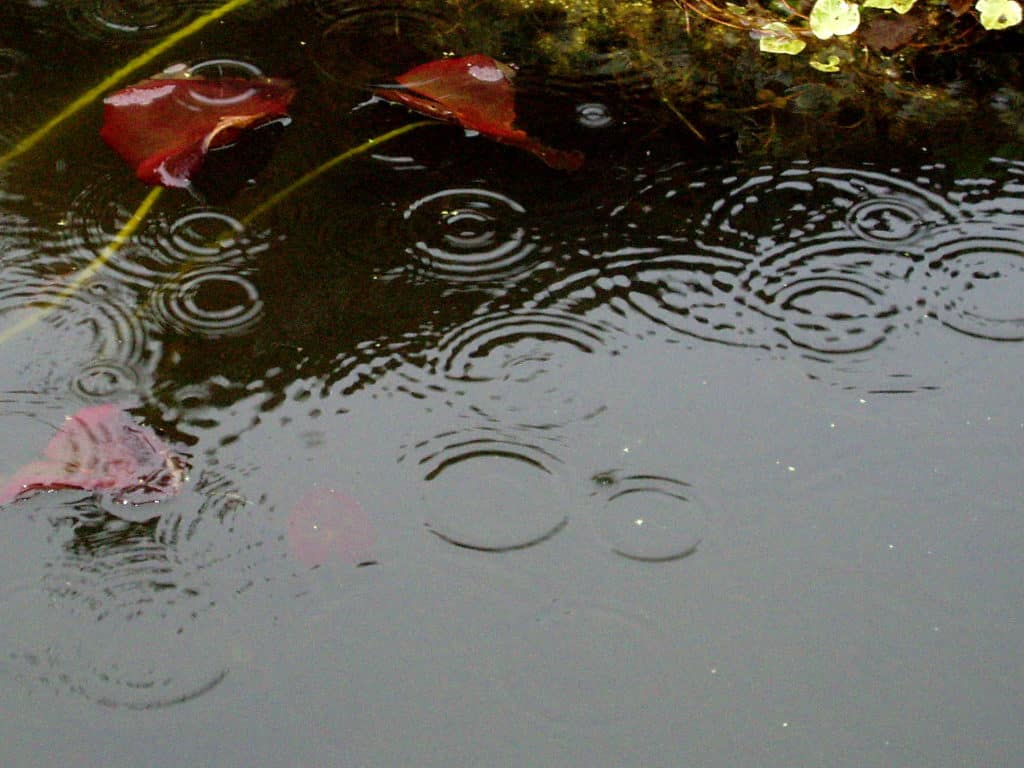Being exposed to the elements, a koi pond in rain can be open to many environmental changes. As long as you plan ahead and have a good grasp of your water quality, there is no reason to worry. If you are not familiar with a koi pond in rainy conditions, be sure to read on!
Rain and pH
The biggest affect rain can have is on your pH. Remember, pH is a measure of the hydrogen ions in a solution and can affect many biological processes, including your fish’s metabolic functions and your biological filtration. Depending on your air and atmospheric influences, you can expect your rain to be fairly acidic. The EPA states the normal pH of rain is 5.0 to 5.5, significantly lower than most outdoor koi ponds. This can go even lower if it is contaminated by pollution from industries and automobiles. Depending on how much rain you receive and the surface area of your pond, you may have some significant pH changes to watch out for.
This is where your kH, or carbonate alkalinity, comes into play. Remember, kH is a part of your gH, or total hardness, but not all, and measures the amount of buffers in your pond. Buffers bind with roaming hydrogen ions and keep your pH stable. If your kH is too low, your pond can start to have a pH crash from too much rain. A kH of 100 mg/L is a good place to start. If your kH drops any lower and lots of rain falls down, your fish could be at risk.
Rain and Temperature
Thankfully, rain has less effect on the temperature of your pond since it is directly impacted by the atmosphere surrounding your pond. High winds, sleet or snow can significantly impact your pond’s temperature in addition to its pH. Depending on your pond’s surface to volume ratio, a koi pond in rain can have significant temperature changes or almost indistinguishable. Large, shallow ponds are the most at risk for changes in temperature during rain.
Snow in Koi Ponds
Snow can have a very similar pH to rain. A koi pond in rain is very similar to a koi pond in snow, especially if your pond surface has not frozen over. With snow, there is the added effect of dropping temperatures. Adding freezing material to a liquid can cause your temperature to drop and your pond to freeze. Provided your pond does not freeze solid, your fish will be just fine. Learn more about what to do for your koi pond in winter.
What to do for koi pond in rain
Before the rains start, check your pH, kH and temperature. These readings will provide a baseline level and be sure to write them down. If you have never checked these before, it is hard to know if what you are looking at is “normal” or not. Here are some reference ranges for koi ponds to get you started.
After the rain or snow starts, and depending on how fast it falls, you should check your pH and/or kH every hour. If you start to see your kH drop, but your pH stays consistent, you should add additional buffering agents to maintain your kH. If your kH and pH start to drop, you need to take immediate action by adding additional buffers and adding source water from your tap. Don’t forget your conditioner! This will offset the drop in pH from rain and provide pH support.
Unfortunately, with temperature fluctuations for a koi pond in rain, there is little you can do. If freezing temperatures are impacting your pond, be aware of supercooling structures, such as waterfalls, that can quickly cause your pond to cool by incorporating cold air very quickly. This can also happen during snow.
Ideally, with a koi pond in rain, you should not see any change in your pH more than 0.5. Your kH should remain above 100 mg/L, dropping to 50 mg/L at the very least.

